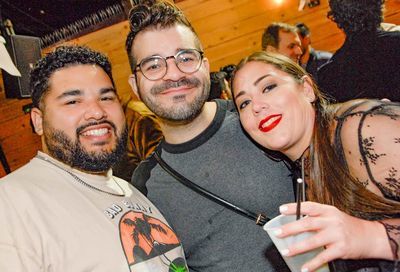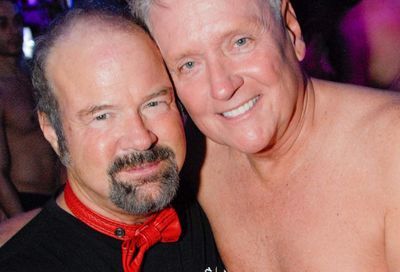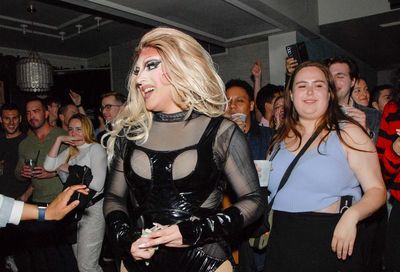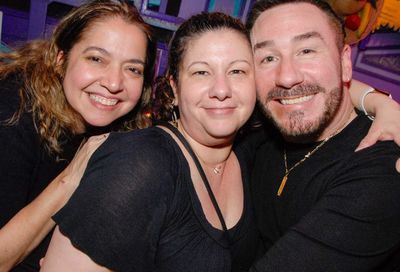State of Play
As established organizations face new perspectives and groups, LGBT advocacy is evolving – despite setbacks and challenges
By Chris Geidner
Illustration by Scott Brooks, ''State of Play''
October 7, 2010
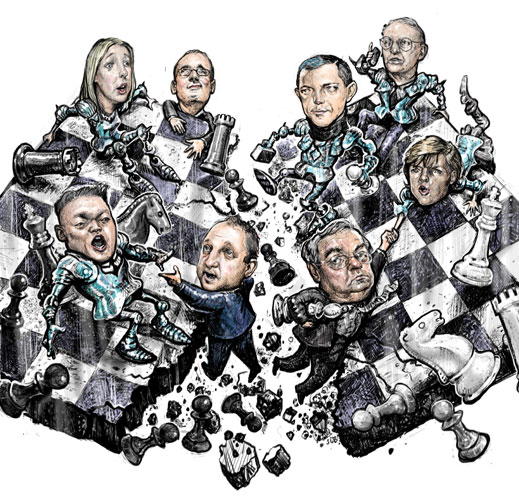

Mara Keisling, the executive director of the National Center for Transgender Equality, had a key legislative priority for the 111th Congress: passage of the Employment Non-Discrimination Act.
With Congress in recess until after the midterm election and no expected chance of passage in any lame-duck session, Keisling is characteristically blunt.
”I failed.”
She goes further than that, though, placing ENDA and other LGBT equality issues in context.
”Congress and the president have lots of priorities, they really do. They have to be working on the economy, they have to be working on health care, they have to be working on the environment – and they have to be working on LGBT rights,” she says. ”Their job is to work all those priorities together. Our job is to make sure they put our rights in their priorities. … And you know what? We weren’t able to do that this year.
”We had a colossal fail this year. But it is simplistic and unhelpful to say that any particular person failed, because every single one of us failed.
”The community failed. The movement failed. The organizations failed. Congress failed. The president failed,” she says. ”Government failed – part of why government failed is because they didn’t prioritize us. Partially that’s because we didn’t make them, partially it’s because the Republicans were just obstructing everything, partially it’s because our community didn’t step up enough, partially it was because our community was scattered in what they wanted. But we failed together.”
Despite that, Keisling says the community has to be ”realistic” about the past two years.
”We still made a lot of progress, we really did. We still got more done in the last two years than we’ve ever gotten done in two years before.”
Keisling’s comments are harsh but not altogether negative and reflect the current reality as assessed by the leaders of many LGBT organizations looking back over the past two years.
Within the LGBT community during that time, several events – from the response to Proposition 8 in California to decisions about the legislative priorities in Congress and approaches to those priorities – have led to some high-profile disagreements among LGBT organizations.
In the progress column, several courts – from San Francisco to Boston, from Riverside, Calif., to Tacoma, Wash. – held in favor of LGBT people’s rights to the equal protection of the laws. These rulings were celebrated, although it remains uncertain whether the government will appeal the decisions.
In the U.S. House, though, there was a noted lack of action on ENDA – despite the fact that the bill originally was scheduled for mark-up in the House Education and Labor Committee on Nov. 18, 2009.
Then, on Sept. 21 of this year, the Senate failed to advance the National Defense Authorization Act – the bill containing the amendment aimed at repealing ”Don’t Ask, Don’t Tell.”
From the administration, credit for significant regulatory actions and agency directives helping improve LGBT people’s lives has been hampered by a perceived lack of public engagement by President Barack Obama on advancing LGBT equality initiatives in Congress.
At the same time, the prospect of the Republicans making electoral gains in the fall has begun weighing heavily on progressive activists and organizations of all stripes pushing for action – with little measurable success – from congressional Democrats.
Against this backdrop, Metro Weekly spoke with the leaders of 15 LGBT political, legal and electoral organizations whose work has a national impact. These conversations, all conducted during the week of Sept. 27, show unexpected agreements and similarities between organizations with significantly different missions. More fundamentally – and despite differences of opinion and of strategy – the interviews make clear that the relationships between LGBT organizations are not easily defined in terms of a ”schism” or even a divide.
As Human Rights Campaign President Joe Solmonese puts it, ”We’re supposed to have disagreements. This is important work. We’re supposed to have big disagreements, and fiery disagreements, passionate disagreements about the road forward.”
Even Robin McGehee, co-founder and director of Get Equal – the organization that burst onto the scene with a dramatic challenge to Solmonese when Dan Choi and James Pietrangelo II chained themselves to the White House fence on March 18 – acknowledged that when it comes to putting forth the strategy that will lead to success, ”I don’t know that answer.”
But – and where she and Solmonese might differ – she adds, ”All that we know is that by playing by the traditional rules, it’s not working.”
From the advent of GOProud, which board Chairman Chris Barron says is ”not interested in the group hug from the gay left,” to Chad Griffin’s decision to recruit top-tier lawyers to file a federal lawsuit aimed at striking down Proposition 8 in California when none of the established legal groups would do it, the traditional rules and traditional roles are being challenged.
The impact and longevity of those challenges remain open questions. But for all the questions about the pursuit of LGBT equality, there are many voices, often leading many people in sometimes differing directions.
For groups like the Gay and Lesbian Victory Fund, which works to elect qualified LGBT candidates, this has impacted the organization’s work.
”My job is to work with the candidates and the officials,” Victory Fund President Chuck Wolfe says. ”Anything I can do that helps them win, that’s what we do. And, in some cases, that’s advising candidates on how to traverse some of these questions when organizations might disagree with each other on positions.”
Rea Carey, who has long been a part of the National Gay and Lesbian Task Force and currently is its executive director, sees these differing voices as a gain for LGBT equality efforts.
”It’s a shift in the number of people and the types of people,” she says – including straight allies – ”who see this as their struggle.”
There is a more diverse range of opinions and organizations pushing for lesbian, gay, bisexual and transgender equality than at any point in the history of the nation.
It could be – and has been – characterized as a mess.
Or it could be, as Barron calls it, ”the maturing of our community’s political movement.”
On the Battlefield
THAT MATURITY WAS perhaps most clear with Keisling’s blunt ”we failed,” but she’s not alone in her assessment. Servicemembers Legal Defense Network Executive Director Aubrey Sarvis, who has faced his own challenges this year, said, ”You can put me in the category with Mara.”
Coming off the loss of the vote to advance the NDAA in the Senate, Sarvis acknowledges the significance of that loss, saying, ”I think it’s very important to be honest about your results.”
”If you’re not, then I think it’s really easy to deceive yourself, going into the next Congress or the next round,” he says, adding, ”Our key stakeholders recognize spin and b.s. when they see it and when they hear it.”
The executive director of Servicemembers United, Alex Nicholson, however, has been among the most strident of organizational leaders criticizing other organizations, participating in an article published by Congress.org that characterized the differing strategy and tactics of LGBT organizations surrounding DADT-repeal efforts as a ”split” in the ”gay-rights movement.”
Speaking to Metro Weekly, Nicholson says, ”I don’t think, in my opinion, work on DADT was done as efficiently and as effectively as it could have been. I don’t think enough money was spent on it. I don’t think the organizations that were involved did everything they could have done.”
Among the organizations at the lead in discussions within the administration and Congress have been SLDN, Servicemembers United, HRC, Center for American Progress (CAP) and the Palm Center – a think tank at the University of California, Santa Barbara. Notably, CAP is not an LGBT organization, although its senior vice president, Winnie Stachelberg, was the political director at HRC for many years.
Referring specifically to HRC, Nicholson adds, ”There was definitely a failure on the part of the organizations that had the money and the capacity to invest to do so in enough time to make enough difference.”
Responding to the Congress.org article’s charge that HRC focused on ENDA at the expense of DADT repeal, Solmonese says, ”The diversity of thought and the diversity of points of view in our community, and the portfolio of HRC, to my way of thinking, make that dynamic inevitable.”
For his part, Sarvis dismisses the entire focus of the article: ”In terms of journalism, I didn’t think it was particularly informative. I think most folks aren’t interested in the differences and the bickering of organizations who are working to achieve LGBT objectives. By and large most folks want us to find a way to work together … and to produce results.”
Solmonese agrees.
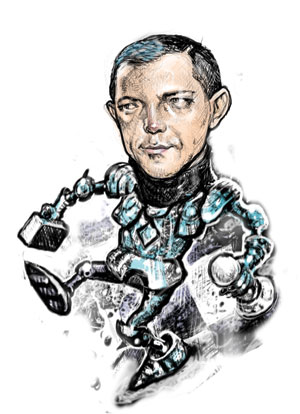
Joe Solmonese
(Illustration by Scott Brooks)
”In the aftermath of that setback in the Senate, perhaps there was a bit of revisionist history going on,” he says in reference to the differing responses to the Senate vote. ”I’m the kind of person, I’ll tolerate about 15 minutes for revisionist history and then we all gotta get back on board, and move in the same direction and get it done.”
But from Nicholson’s viewpoint, part of getting back onboard includes organizations such as HRC changing their way of doing business.
”In my opinion, HRC … probably invested at most, maybe a quarter of what they could have invested,” he says. ”In terms of moving forward, I think the organizations with the resources and that claim to represent the community as a whole have to make serious commitments and I think need to be held accountable.”
Sarvis says that such disputes among nonprofits are ”always challenging,” but pointed to the business community for some model behaviors.
”Allies [there] work together, they avoid surprises, they avoid bickering wherever possible. I think allies in the corporate sector are focused on the bottom-line objective: Achieve the goal.”
Looking ahead to that goal, Solmonese argues that it is the response to the Senate loss in September that is most important – for the LGBT community and for HRC and its organizational partners.
”How we move forward as a community, as a coalition of organizations,” he says, ”between now and the potential vote in the lame-duck session has a great deal to do with how we’re going to be seen and how we’re going to be remembered as having worked our way through this particular legislative fight.”
In the Courtroom
SLDN, THOUGH FULLY engaged in the DADT-repeal efforts in Congress, also has its roots as a legal-service organization, representing servicemembers facing discharge under the policy.
As Sarvis says, ”I think it’s helpful to be steeped in working in both worlds … actively pursuing strategies in the courts and in the Congress. They can be complementary.”
National Center for Lesbian Rights Executive Director Kate Kendell more colorfully assesses the reason for focusing on legal efforts, saying of the situation in Washington, ”Things are more fucked up than you think.”
”I actually believe that, but let me explain it,” she says. ”I think we are faced with a more toxic environment in D.C. than we’ve ever seen. It’s quite clear that our issues are not prioritized in the way we thought they were going to be by the administration or leadership in Congress.”
As Jon Davidson, legal director at Lambda Legal Defense and Education Fund, says of the distinction between legal and other LGBT organizations, ”I think there are sometimes people who lump all of the groups together as ‘Gay Inc.,’ in a way that I find really troubling because the organizations are not all the same.
”I think our organization – and I would say this with respect to most of the legal organizations – have amazing track records of success.”
At least in the past year, the facts bear out that claim. As Kendell puts it, ”It is as if judges have finally found their voice.”
The U.S. Supreme Court sided with LGBT organizations in both cases from this past term that intersected with LGBT issues.
Then, starting with U.S. District Judge Joseph Tauro’s decision striking down Section 3 of the Defense of Marriage Act (DOMA) as unconstitutional on July 8, a string of unprecedented federal trial court decisions advanced LGBT equal protection claims with unanimity. Courts struck down California’s Proposition 8, struck down DADT and, most recently, held on Sept. 24 that Air Force Reserve Maj. Margaret Witt was to be reinstated to the Air Force Reserve because the military could not meet the appellate court’s standard for allowing her DADT discharge to stand.
Although the rulings themselves were striking for their propositions of law and though the Justice Department has not announced whether it will be appealing any or all of the decisions, the cases also were noteworthy for the organizations behind the lawsuits. Of the four, only two were brought by the longstanding legal organizations dedicated to these issues.
Gay and Lesbian Advocates and Defenders (GLAD), the organization best known nationally for bringing the case that ended with marriage equality in Massachusetts, is now behind Gill v. Office of Personnel Management – the case challenging DOMA’s federal definition of marriage. The ACLU of Washington represents Witt.
Lee Swislow, GLAD’s executive director, says of the strategy behind the DOMA case, ”It’s not a surprise that we filed Gill because Massachusetts was the first state to get marriage. … We’ve been planning to file [this] challenge … as soon as we had the right group of plaintiffs who had suffered concrete harms.”
Swislow noted that there were ”extensive conversations” between GLAD, Lambda Legal, NCLR and the ACLU Lesbian and Gay Rights Project prior to the filing of the case, as well as discussions in Washington to ensure ”support from key legislative leaders.”
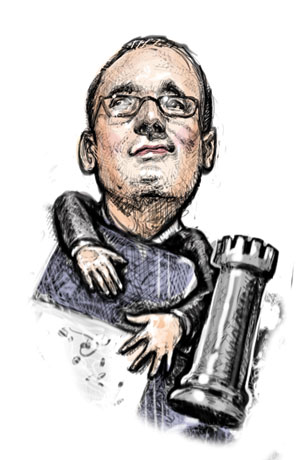
Chad Griffin
(Illustration by Scott Brooks)
Although Chad Griffin spoke to others – including Lambda Legal, NCLR and the ACLU – about his interest in filing a federal lawsuit challenging Proposition 8 in California, he formed a new organization to bring the Perry v. Schwarzenegger challenge featuring the Ted Olson-David Boies headline-grabbing legal team and a trial that – in terms of LGBT issues – received unmatched media coverage.
Griffin, board president of the American Foundation for Equal Rights (AFER), doesn’t mince words about his aims – ”we don’t have time,” he says, to wait – or his perception of the case’s successes outside of the legal victory, calling it ”perhaps the grandest public-awareness campaign that this movement has ever seen.”
Despite some early and ongoing questions about the wisdom and consequences of the case, though, the leaders of GLAD, Lambda Legal and NCLR all quickly moved on to giving the support they could once the case was filed and put on the fast track for the trial held in January.
Swislow notes that the case has ”given the issue of marriage a kind of exposure and credibility … that has been enormously helpful.”
Adds Kendell, ”When you can bring a federal lawsuit, and fund it to scale … and you’re able to have 40 attorneys working on it, that changes everything. Given what we now know about the resources brought to bear and the extraordinary evidentiary presentation at trial, if there’s any chance of taking down Prop. 8, this is it.”
Across the Aisle
NOT AS MUCH PRAISE came for the fourth of the recent spate of successful federal cases.
Log Cabin Republicans v. United States was not brought by a legal organization at all but rather by the group that LCR Executive Director R. Clarke Cooper calls ”the voice within the party.”
Unlike the celebration for Olson, Boies and Griffin over the Proposition 8 victory in August, Cooper said that the victory in LCR’s case was different.
”When the ruling did come out,” he says, ”many, many, many organizations – brother and sister organizations – just referred to it as ‘the ruling,’ and didn’t even reference us, the plaintiff, at all.”
Cooper detailed how staff contacted those other organizations and says that ”corrective measures” were taken by some to acknowledge LCR’s role.
Contrast that with GOProud’s Barron, who caused a stir the evening after his organization’s Homocon event with Ann Coulter when he sent a message telling the ”Gay Left” on Twitter that he ”could give a shit what you think.”
Saying a few days later that he ”100 percent meant it,” Barron explains, ”I don’t need them – and our members don’t need them – to say, ‘You’re good little team players.’
”We know what effect our work is having on conservatives and on the conservative movement and on changing hearts and minds, so I don’t care whether or not the left gets it. They’re free to criticize, but I really don’t care.”
Barron, though, doesn’t see that as particularly noteworthy.
”This shouldn’t be surprising. The gay left doesn’t care what we think about them. Get Equal doesn’t care that I think Dan Choi chaining himself to the White House fence was the theater of the absurd. They don’t care,” Barron says. ”Why the hell should I care that they don’t like that we held an event with Ann Coulter?”
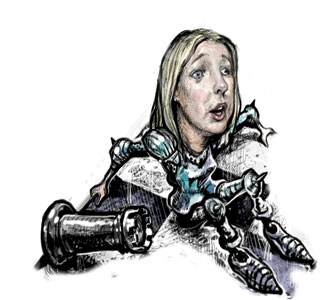
Robin McGehee
(Illustration by Scott Brooks)
McGehee agrees, in part, saying of GOProud and Get Equal, ”We’re pushing and challenging the traditional organizations that have been branded to represent us to do it better and to do it differently.”
She adds, though, ”I definitely don’t relate to their value system,” calling Coulter’s speech an example of GOProud’s ”internalized homophobia.”
Where McGehee sees internalized homophobia, though, Barron sees the purpose of his organization.
”We’re never going to have real leadership on gay issues within the party until the base moves – until the conservative movement moves,” he says.
Barron pointed to the recognition by LCR of Sen. John Cornyn (R-Texas), the head of the National Republican Senatorial Committee, and Rep. Pete Sessions (R-Texas), the head of the National Republican Congressional Committee, at its Sept. 22 national dinner – a move that LCR’s Cooper posits was an example of the Republican Party ”saying there’s some positive that can come from” LCR and inclusion of gay people in the GOP.
”You can give all the awards you want to all the Republican leadership out there,” Barron says. ”[T]hey’re not going to change where they are on these issues … until Tea Party activists [are] saying, ‘I can’t believe you’re talking about federalizing marriage. It’s a total power grab.”’
One of the closest points of comparison to Barron’s mission came from a surprising source – the Task Force’s Carey, who describes her organization as ”asserting ourselves more as a partner and a voice in broader progressive circles as an LGBT organization.”
More so even than the comparisons between Get Equal and GOProud, it is Carey’s emphasis on coalition building and providing an ideological – but not partisan – view of the LGBT equality movement.
Of GOProud’s aim to reach out to conservatives, Carey says, ”It reinforces, although we’re coming at it from different angles … that I think what we’re seeing is an evolution of understanding, in a very deep way, that no social justice or civil rights struggle has ever won without allies.”
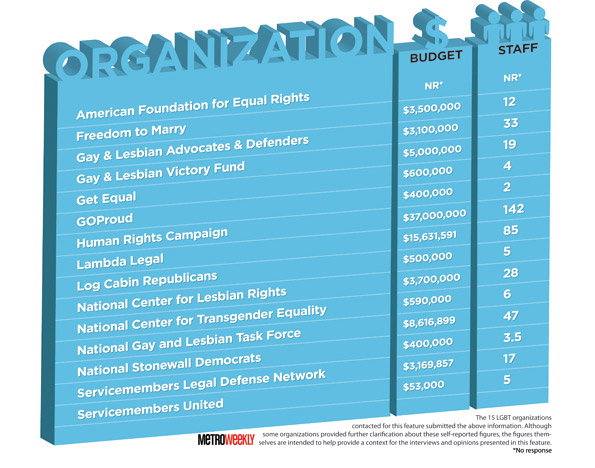
From the Top
ALTHOUGH THERE MAY be an evolution of understanding, the expectations of the LGBT community also are evolving.
Michael Mitchell, the executive director of Stonewall Democrats, says simply, ”I think that we’ve not done a good job at managing the expectations of how long it does take to actually get equality – and what that process is.”
SLDN’s Sarvis agrees, asking, ”How ambitious was the LGBT legislative agenda in Washington in this Congress? As a community, there have been a number of measures we’ve been pursuing.
”There have been some measurable, concrete results, whether it was by executive order, revised regulations or new directives,” he says, calling those results positive. ”When you look at the legislative results, how many concrete initiatives do we have to point to? … Hate crimes. Significant, helpful, but is it enough? I would submit it’s not enough. I think the people who support us are looking for more accountability.”
Freedom to Marry Executive Director Evan Wolfson – who like several others mentions the end of his organization as a goal – points to simple steps he’s taken to create public accountability and allow for support of his organization.
”That’s why I’m very transparent about what our strategy is,” he says. ”It’s on our website: the ‘Roadmap to Victory.”’
For HRC’s Solmonese, an examination of losses is also about looking forward.
”In the times of setbacks, in the times of things happening that we don’t expect, in times when we have failed in things that we have attempted to do – and we fail a lot in the movement,” he says, ”how we move forward [leads to] how we’re going to be remembered.”
Directly or indirectly, though, many look to HRC – the largest LGBT organization by far, with an annual budget of $37 million and staff of nearly 150 people – to be held accountable for those failures, whether they are perceived to have resulted from HRC’s actions, inaction or choice of priorities.
”What I take most issue with,” Solmonese says, ”is when someone says, ‘HRC doesn’t speak for me’ or ‘HRC doesn’t speak for the entire community’… [I]t’s my commitment and the organization’s commitment that we are mindful of the diverse needs and the diverse challenges that exist out there for LGBT people all across this country.
”I was talking … this morning about going out to Kansas to Sprint [with which HRC works on LGBT corporate equality issues]. … When you drive an hour west of Kansas City, and you’re out there, and you’re at Sprint, it is an island. It is an island in a place where it’s really tough to be an LGBT person.”
In addition to its workplace efforts, which have been praised even by many of those most critical of HRC, Solmonese pointed to President Obama’s action, and HRC’s help, earlier this year to prohibit hospitals that accept Medicaid and Medicare funds from discriminating against LGBT people.
”Now, every hospital – or at some point every hospital – is going to have to have a nondiscrimination policy that covers sexual orientation and gender identity,” he says. ”That’s going to be true for hospitals in Kansas, too. And that’s going to send a message to the hospitals and it’s going to send a message to the [same-sex parents] who are standing there with their kid who split [his or her] head open thinking about what they’re going to do and where they’re going to go.”
At the same time, Solmonese says the debate among LGBT people is necessary and that, without it, ”it would mean there wasn’t enough passion in the work we’re trying to get done.”
Wolfson agrees: ”Disagreement is an inevitable feature of family, of movement and of life, and I don’t think it’s the end of the world if we don’t all agree on everything all the time.”
Still, he offers a caveat.
”What is bad, though, is if we allow those disagreements to become just a satisfying way to spend time disagreeing, rather than focusing on what we can do to move the ball forward.”
Solmonese acknowledges that some think he is ”a little too Zen” about the disputes and differences. But he thinks that is the way to move the ball forward.
”I think – and maybe I’m more of a student of history and someone who has followed the arc of these sorts of things in other moments of social change in this country – I think that it has gone exactly as it is supposed to go,” he says.
”In moments of sweeping social change, when things seem so far away … there are a small handful of people focused on the work – and there is not all that much disagreement,” he explains. ”As is always the case in this country, as you get closer to accomplishing whatever it is that you are setting out to do … more and more people come into the fight.”
”Whether it is more and more activists and discharged soldiers … coming into the fight to repeal ‘Don’t Ask, Don’t Tell,”’ he says, ”or whether it is Chad [Griffin] and a different point of view about a different legal strategy coming into the legal piece of the marriage fight … to me, that’s exactly the way in which social change is supposed to happen.”
David Mixner: Politically Speaking – The Metro Weekly Interview
To say that David Mixner has opinions on just about everything is an understatement. We get to know the legendary gay politico.
By Randy Shulman on March 12, 2024 @RandyShulman
Editor's Note: This in-depth interview with David Mixner, who passed away on Monday, March 11, 2024, at the age of 77, originally appeared in the issue of July 29, 2004. Photography by Todd Franson.
"You want a soundbite?"
David Mixner grins.
"I'll give you a soundbite. I'm a man who's devoted forty years of his life -- sometimes at great validation and sometimes at great pain -- to the struggle for freedom and human rights.
"You know, when I was a child growing up," he continues, "we didn't have television, but we got Life magazine. And it opened the outside world to us. As a kid I said, 'I want to live the history of my times. I want to witness it.' And then I got to a second level where I said, 'God, if I could just meet and shake the hands of the people making the history of my times, I'd be happy.' And then I said to myself, 'If I could just be a tiny footnote in the history of my times.'
Nashville Settles HIV Discrimination Lawsuit
The Metro Nashville government agreed to adopt policies allowing people with HIV to serve as police officers.
By John Riley on April 5, 2024 @JRileyMW
The Metropolitan Government of Nashville and Davidson County settled a lawsuit brought by Lambda Legal alleging that the Metropolitan Nashville Police Department's hiring policies unfairly discriminated against people with HIV.
The lawsuit claimed that the plaintiff, a 45-year-old decorated civil servant going by the pseudonym John Doe, had applied to work for the police department in 2020, and was initially offered a job.
However, the department later rescinded that offer after learning, during the Civil Service Medical Officer's exam process, that Doe is living with HIV.
Biden’s New School Rules Protect LGBTQ Students
New Title IX rules from the Biden administration protect LGBTQ students from discrimination, but sidestep transgender athlete eligibility.
By John Riley on April 19, 2024 @JRileyMW
On April 19, the Biden administration issued new rules outlining schools' obligations under Title IX, the federal law prohibiting sex-based discrimination -- including explicit protections for LGBTQ students.
The new rules, which take effect August 1, expand Title IX's protections against sex-based discrimination in educational programs that receive federal funding by prohibiting discrimination and harassment based on sexual orientation and gender identity in federally-funded educational programs.
That explicit expansion of the law seeks to align Title IX guidance with the principles undergirding a landmark 2020 Supreme Court decision finding that the Civil Rights Act protects LGBTQ workers from workplace discrimination, and that instances of anti-LGBTQ discrimination are inherently a form of sex-based discrimination.
Support Metro Weekly’s Journalism
These are challenging times for news organizations. And yet it’s crucial we stay active and provide vital resources and information to both our local readers and the world. So won’t you please take a moment and consider supporting Metro Weekly with a membership? For as little as $5 a month, you can help ensure Metro Weekly magazine and MetroWeekly.com remain free, viable resources as we provide the best, most diverse, culturally-resonant LGBTQ coverage in both the D.C. region and around the world. Memberships come with exclusive perks and discounts, your own personal digital delivery of each week’s magazine (and an archive), access to our Member's Lounge when it launches this fall, and exclusive members-only items like Metro Weekly Membership Mugs and Tote Bags! Check out all our membership levels here and please join us today!
The Magazine
-
Most Popular
 School Board Cancels '30 Rock' Star's Anti-Bullying Talk
School Board Cancels '30 Rock' Star's Anti-Bullying Talk  Aaron Rodgers Suggests AIDS Was Created by U.S. Government
Aaron Rodgers Suggests AIDS Was Created by U.S. Government  Biden's New School Rules Protect LGBTQ Students
Biden's New School Rules Protect LGBTQ Students  LGBTQ Websites Could Be Sued Under Kansas Anti-Porn Law
LGBTQ Websites Could Be Sued Under Kansas Anti-Porn Law  How Vending Machines Can Save Lives in Substance Abuse Crisis
How Vending Machines Can Save Lives in Substance Abuse Crisis  Star Trek Discovery's Wilson Cruz Keeps Making Television History
Star Trek Discovery's Wilson Cruz Keeps Making Television History  Mississippi Man Accused of Slaughtering Ex-Boyfriend
Mississippi Man Accused of Slaughtering Ex-Boyfriend  Conservative Ad Makes Case for Transgender Rights
Conservative Ad Makes Case for Transgender Rights  Cherry Returns With An Intimate Affair
Cherry Returns With An Intimate Affair  Mosaic's 'Nancy' is a Pungent, Absurdist Satire (Review)
Mosaic's 'Nancy' is a Pungent, Absurdist Satire (Review)
 Biden's New School Rules Protect LGBTQ Students
Biden's New School Rules Protect LGBTQ Students  School Board Cancels '30 Rock' Star's Anti-Bullying Talk
School Board Cancels '30 Rock' Star's Anti-Bullying Talk  Aaron Rodgers Suggests AIDS Was Created by U.S. Government
Aaron Rodgers Suggests AIDS Was Created by U.S. Government  LGBTQ Websites Could Be Sued Under Kansas Anti-Porn Law
LGBTQ Websites Could Be Sued Under Kansas Anti-Porn Law  HRC's Kelley Robinson Makes the Time 100 List
HRC's Kelley Robinson Makes the Time 100 List  Grindr's New Feature "Roam" Connects Users Around the Globe
Grindr's New Feature "Roam" Connects Users Around the Globe  Kansas Governor Vetoes Trans Health Care Ban
Kansas Governor Vetoes Trans Health Care Ban  Court Blocks West Virginia Trans Athlete Ban
Court Blocks West Virginia Trans Athlete Ban  DC Black Pride 2024: Everything You Need to Know
DC Black Pride 2024: Everything You Need to Know  Conservative Ad Makes Case for Transgender Rights
Conservative Ad Makes Case for Transgender Rights
Scene
Metro Weekly
Washington's LGBTQ Magazine
P.O. Box 11559
Washington, DC 20008 (202) 638-6830
About Us pageFollow Us:
· Facebook
· Twitter
· Flipboard
· YouTube
· Instagram
· RSS News | RSS SceneArchives
- "We use cookies and other data collection technologies to provide the best experience for our customers. You may request that your data not be shared with third parties here: "Do Not Sell My Data
Copyright ©2024 Jansi LLC.







